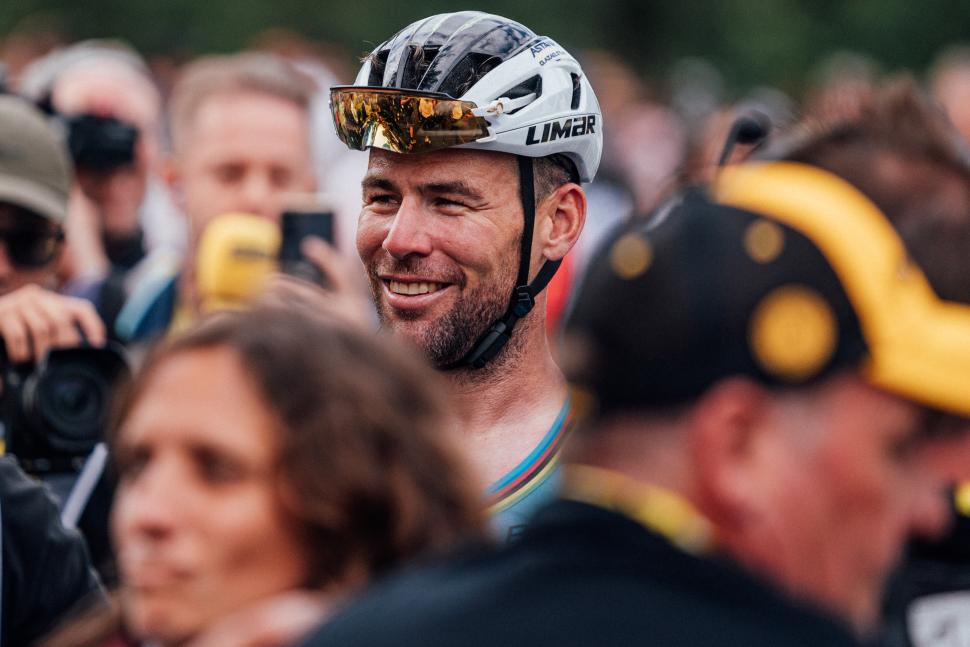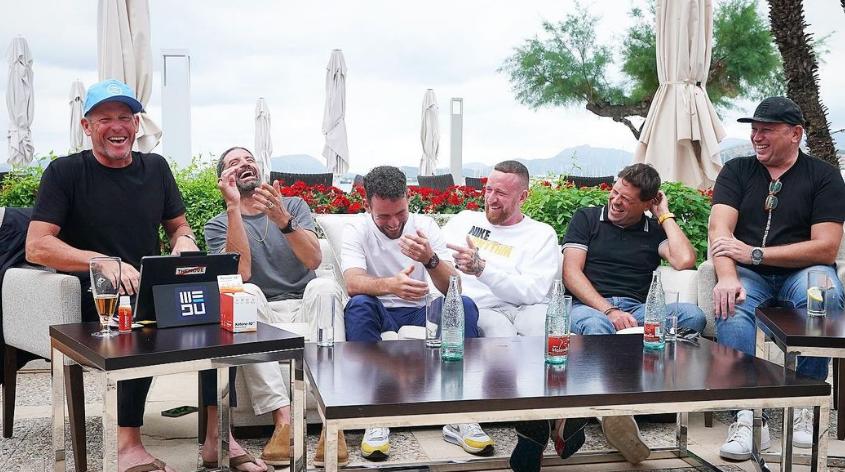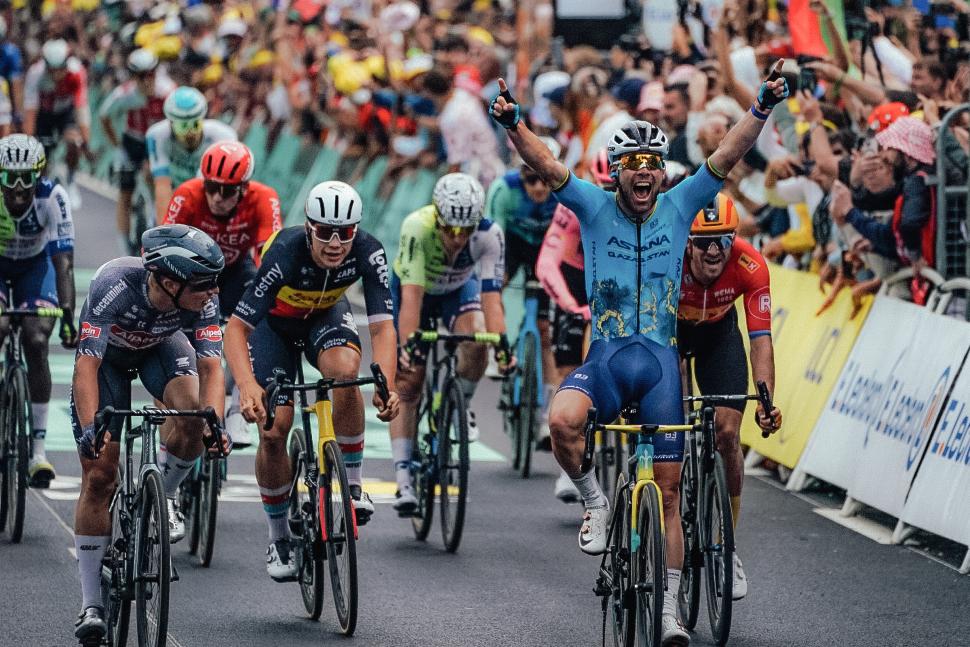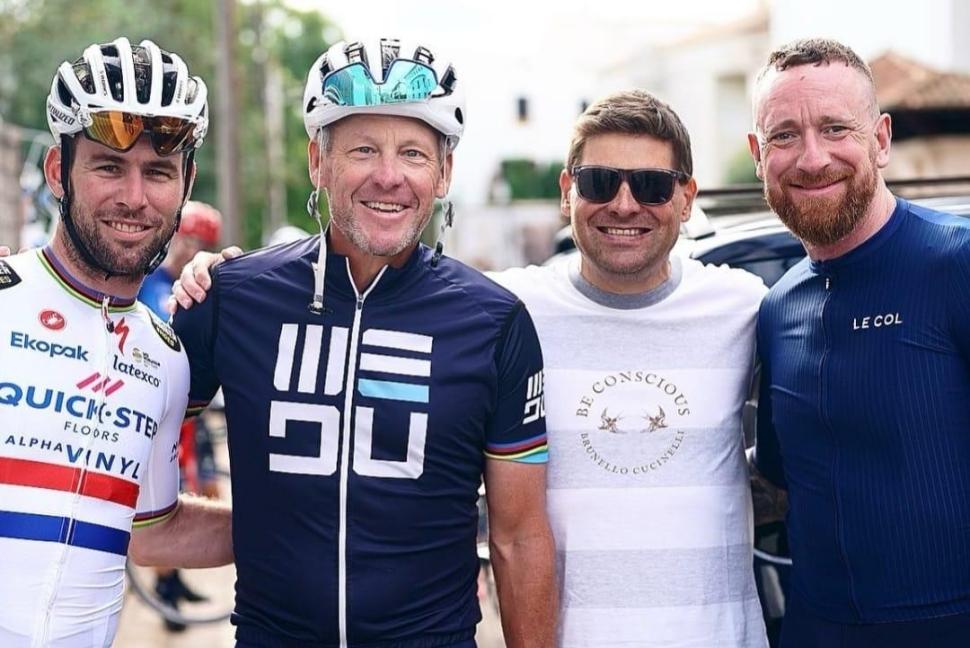Mark Cavendish has claimed that he would not have been able to achieve what he did in professional cycling – including 35 Tour de France stage wins, a world road race title, and victory at Milan-Sanremo – if the sport had still been plagued by the systemic doping practices of previous eras.
Speaking on TalkSport as part of a series of radio and television appearances to promote his new autobiography, Believe, Cavendish admitted that he once viewed Lance Armstrong as an idol and that the disgraced Texan was “very good” to him during his first few years in the peloton.
However, the retired sprinter also claimed that, since the plethora of doping scandals that culminated in Armstrong’s lifetime ban in 2012, cycling has transformed into “one of, if not the, cleanest sport in the world” due to its proactive attempts to address and combat the use of performance enhancing drugs.
During the interview, Cavendish, who retired last year after winning a record-breaking 35th stage win at the Tour de France, was asked if cycling has fully recovered from the Armstrong era, 12 years after the American was stripped of his seven Tour titles and banned for life for orchestrating what USADA described as the “most sophisticated drugs cheating programme in sports history.”
 Mark Cavendish wins record 35th Tour de France stage, 2024 Tour de France, stage 5 (credit: Zac Williams/SWpix.com)
Mark Cavendish wins record 35th Tour de France stage, 2024 Tour de France, stage 5 (credit: Zac Williams/SWpix.com)
“I think so, yeah,” the Manx sprinter replied. “We’ll never get away from our past as a sport, but cycling puts the time, effort, and money into combat doping. There’ll still be people who are caught for cheating and stuff like that.
“It’s not saying, ‘I’m a cheat, so I’m going to be a cyclist’. That’s not how it works. It happens in all sports. It happens in entertainment, business.
“Anywhere there’s money we gain, people will cheat. If you put the time, the effort, the money into catching a cheat, you will do it.
“That’s what cycling did on a big level and it had a damaged reputation. Don’t get me wrong, it had a damaged reputation because there were people cheating.”
> Why was Mark Cavendish riding with Lance Armstrong this week?
The former world champion was also asked if he ever viewed Armstrong, who Cavendish raced against during the former US Postal leader’s ill-fated comeback of 2009 and 2010, as an “idol”.
“He was growing up,” Cavendish said. “And Lance was very good to me when I was young.
“I think obviously Lance gained a lot more than anyone else from the sport. So likewise, he lost a lot more than anyone else in the sport.”
 The Move podcast panel, Mallorca (credit: Elizabeth Kreutz)
The Move podcast panel, Mallorca (credit: Elizabeth Kreutz)
This week’s interview isn’t the first time Cavendish has cited Armstrong’s personal support for and encouragement of his fledging career.
In his first autobiography At Speed, published in 2013 – the same year Armstrong confessed his doping to Oprah Winfrey – 2011 world champion Cavendish described the 1993 rainbow jersey winner as “mesmeric”.
And, while describing the “bitterness” of learning that Armstrong’s dominance was all a carefully orchestrated charade, Cavendish acknowledged at the time that the “race to expose him at times resembled a witch-hunt”.
However, speaking on TalkSport, the 40-year-old claimed that the changes that took place in the sport following Armstrong’s highly publicised demise were instrumental in influencing the direction of his career.
“I tell you, I could not have done what I did in the sport if cycling was how it was in the past,” he said.
“Twenty years later, I’m answering questions about it, which will always be the case. But it’s actually nice to be able to talk about how I see it and how I’ve experienced it.
“I know that, fundamentally, I believe I’ve raced in one of, if not the, cleanest sport in the world – because they do the stuff to combat doping.”
Cavendish’s comments about doping were made on the same day that the UCI announced that Red Bull-Bora-Hansgrohe rider Oier Lazkano has been provisionally suspended due to “unexplained abnormalities” in his biological passport, which were found during the Spaniard’s three-year stint at Movistar between 2022 and 2024.
The 25-year-old becomes the latest rider to fall foul of the governing body’s biological passport system, which attempts to spot patterns of doping by tracing a rider’s blood values and biological profile over time, in a bid to spot anomalies indicative of drug use, and has been let go by his Red Bull-Bora team.
Elsewhere in his interview with TalkSport, Cavendish reflected on his groundbreaking 19-year career, which saw him win 165 races in total, including 35 Tour stages, two green jerseys, 17 Giro d’Italia stages, and the 2011 world title, cementing himself as the greatest sprinter the sport has ever seen.
“I’m pretty happy with it. Don’t get me wrong, after 19 years, I was well old at the end,” he said, before turning to that historic afternoon in Vulbas last July, when he sprinted to his 35th victory at the Tour, finally breaking the record he had shared with Eddy Merckx.
“I won everything I could win and how many sports people get to say they finished on a high, at the top?” Cavendish continued.
“I nearly didn’t. There were a few years I nearly didn’t. I nearly had to just stop. It nearly killed me doing it, but I was able to kind of do that. Physically I was old. I was nearly 40 when I won, and that’s old for a cyclist.”
 Mark Cavendish wins record 35th Tour de France stage, 2024 Tour de France, stage 5 (credit: Zac Williams/SWpix.com)
Mark Cavendish wins record 35th Tour de France stage, 2024 Tour de France, stage 5 (credit: Zac Williams/SWpix.com)
The 40-year-old also discussed his incredible return to the sport’s pinnacle in 2021, when he overcame years of mental health struggles and a prolonged spell recovering from Epstein–Barr virus to get back to the Tour and win four stages for Deceuninck-Quick Step (as a late call-up), hauling himself level with Merckx’s 34 and winning his second green jersey in the process.
“Normally, you take a couple of months off and you recover from. Mine was a bit misdiagnosed, and it ended up putting me on my knees for a couple of years,” he said, discussing his troubles with Epstein-Barr.
That illness, Cavendish says, took a severe toll on his mental health, the sprinter describing himself as a “nightmare to live with” during that period, which saw him muster only two victories between 2017 and the start of 2021, his time at the top seemingly over.
“I think any sportsperson, if you can’t do your sport at a high level, that’s your life, it’s how you make your living, it’s everything you are as a person, if you can’t do that, it’s not going to be easy,” he said. “I’m lucky I had a supportive family and network around me.
“The hard thing then was getting a job, I couldn’t get a job after that, I had done everything I’d done, and there are people who had never won a bike race, and likely never win a bike race, get a job before me, who had won all these bike races, because I had been sick.”
Speaking about his decision to retire, his place in Tour and cycling history secured, Cavendish concluded: “The work that came into it, from being old, the physicality goes. The work you have to put in, the time away from home, starving myself, being hungry all the time, and the toll it took on my mental health, which I think people are talking about now, was quite big.”

